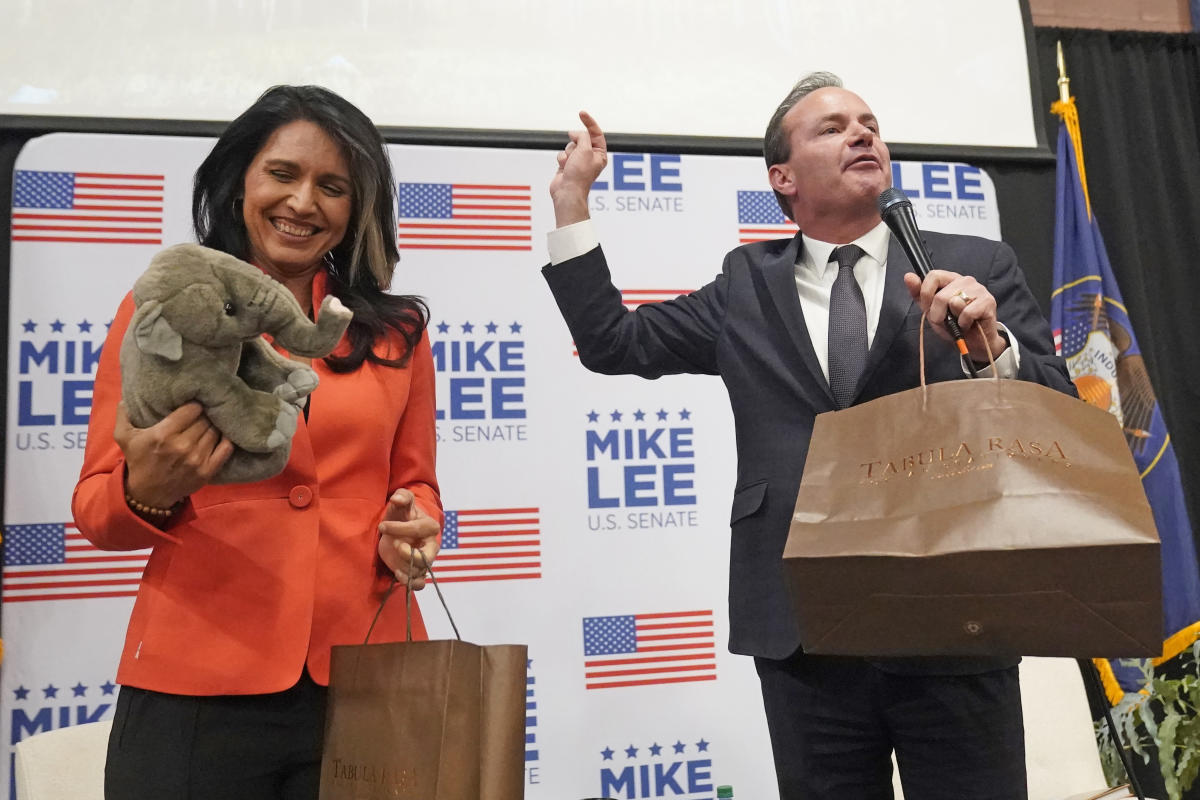
Republicans once slammed Tulsi Gabbard as a socialist seeking to appease dictators like Bashar al-Assad and Vladimir Putin. These days, much of the GOP is embracing her.
Since the former Hawaii Democratic congresswoman made a public show of her decision to leave the party last month, she has gone on to endorse several top Republicans in the run-up to next week’s midterm elections. Some GOP candidates appearing with Gabbard — who previously defended Putin’s rationale for invading Ukraine — have echoed Donald Trump’s opposition to helping Kyiv beat back Moscow.
Republicans across the ideological spectrum are eagerly accepting Gabbard’s endorsement and even hosting her for rallies in their home states, arguing her departure from the Democratic Party bolsters their view that it has moved too far to the left.
But the GOP’s unapologetic embrace of Gabbard is particularly conspicuous as its leaders try to dispel the notion that they’re not tough enough on Russia amid a sharp internal divide over aiding Ukraine. It also comes as questions mount over whether a Republican-controlled House would continue to approve funding for Ukraine’s defense and humanitarian needs.
“I don’t talk to her about which races she’s involved in. But I do think people are watching that and saying, ‘OK, something’s going on out there,’” said House Minority Whip Steve Scalise (R-La.), who recently took time off the campaign trail to appear on Gabbard’s podcast and described her as a close friend.
The GOP’s political dalliance with Gabbard is only the latest sign of how quickly the party is shifting toward the “America First” foreign-policy doctrine espoused by Trump. Even the party’s more traditional defense hawks are justifying the public alignment with an early Bernie Sanders backer who has expressed views once considered heresy in the Republican Party.
Trotting out Gabbard could prove risky for a party that has spent much of Putin’s months-long war on Ukraine playing political defense over Russia, with influential conservatives like Fox News’ Tucker Carlson disrupting the party’s efforts to project commitment to the Western coalition. Even Trump-skeptical Republicans like Rep. Nancy Mace of South Carolina have welcomed and touted Gabbard’s support, if only to highlight the “extremism” of the Democratic Party.
After appearing earlier this year to boost Putin’s belief that Ukraine’s alignment with the West threatens Russia’s security, Gabbard has since endorsed Republicans like J.D. Vance — the Ohio Senate candidate who has said he doesn’t “care” what happens to Ukraine and recently echoed Trump’s view that Ukraine should go to the negotiating table with Russia. (That notion has been rejected by the Ukrainian government, as it would likely require it to relinquish territory to Moscow.)
While Gabbard has not formally joined the Republican Party, her stance isn’t too far outside the GOP mainstream. Polling data shows Republicans growing increasingly wary of supporting Ukraine with weapons and economic aid, views once considered to be on the isolationist fringes of the GOP are becoming more accepted in the party.
The broad swath of Republicans linking arms with Gabbard, from Trumpian candidates to more moderate lawmakers like Mace, isn’t going over well with some on the right. Those conservatives are puzzled by the strategy of allying with the former Hawaii congresswoman in the closing days of a midterm campaign in which Republicans are already favored to win big.
“The only reason people know who Tulsi Gabbard is, particularly on the right, is because she has become a darling of the alt-right because of her statements on Russia,” said Heath Mayo, a conservative activist who founded the advocacy group Principles First. “They’re saying they like her pro-‘America First’ views, when she’s primarily known by most of the American electorate for having met with Assad and partially blamed America for him gassing his citizens, and blamed America for Putin invading Ukraine.”
“It’s clear to everyone that what Tulsi Gabbard represents,” Mayo added, “is isolationism and excuses for dictators.”
Gabbard did not respond to multiple requests for comment.
GOP lawmakers who remain staunchly in the party’s neoconservative wing are willing to overlook Gabbard’s history on Russia — like her penchant to call Republicans “warmongers” for supporting military aid to U.S. allies and a raft of sanctions targeting adversaries — because of her decision to leave the Democratic Party and disparage it on her way out the door.
“Many campaigns are embracing her because she’s a former Democrat who has woken up to the left’s extreme policies,” said one GOP lawmaker who has worked with her in the past, speaking candidly about Gabbard on condition of anonymity. “Yes, her views have tended to be isolationist, but we have always had civil and respectful engagements on a personal level.”
Rep. Don Bacon (R-Neb.), a defense hawk in his own right, told POLITICO that it’s “good” for Republicans to embrace Gabbard because “it undermines Democrats’ message that [the Republican Party] is too extreme and bad for democracy,” the latter of which is a key tenet of President Joe Biden’s closing argument before the midterms.
Gabbard’s decision to leave the party and boost Trump-backed GOP candidates has unsurprisingly rankled her former Democratic colleagues, especially considering that she has backed right-wing candidates who continue to falsely claim that the 2020 election was “stolen.”
Rep. Seth Moulton (D-Mass.), a fellow military veteran, said he “often questioned” Gabbard’s positions on national-security issues when they shared a party affiliation but now doubts her “fundamental principles.”
“I’m not afraid to criticize the Democratic Party myself. But actively campaigning for people who want to undermine elections and undermine our national security is another deal entirely,” Moulton said in an interview.
In the meantime, the Biden administration is considering whether to ask Congress for a supersized Ukraine aid package as part of year-end governing funding talks, as White House aides worry about the prospect of a GOP-led House putting up a fight over new weapons transfers and humanitarian aid.
House Minority Leader Kevin McCarthy, in line to be speaker if Republicans win control of the chamber, has suggested that the GOP might give additional scrutiny to the Biden administration’s funding requests.
Olivia Beavers and Connor O’Brien contributed to this report.




